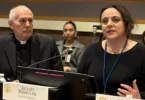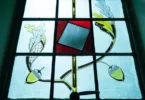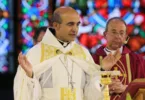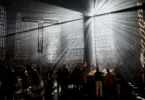
A young man carries a large crucifix during a procession as part of Holy Week celebrations in Izalco, El Salvador, March 24. (CNS photos/Jose Cabezas, Reuters)
by Rhina Guidos
SOYAPANGO, El Salvador (CNS) — When life is good, I’m able to get some vacation days off during Holy Week to visit my homeland of El Salvador. It’s usually a festive time filled with lots of hugs, too much food and streets filled with fellow Catholics whose numbers I love joining in religious processions and events in and around the city.
It’s a type of pilgrimage to come and hear raw and real testimony of faith that has sustained the people of our country through wars, exploitation, poverty, forced migration, and, these days, rampant violence. With all its problems and history, there isn’t another place in the world I would prefer during these holiest of days.
When I was a child here, I always sensed a degree of tension, a distrustfulness, among Salvadorans, one I mostly experienced watching family members who had little to say to others outside our clan — a coping mechanism, I imagine, to survive in a time of war. During my Holy Week visit this year, I feel that same tension I felt as a child. It’s as if something in society here were about to boil over.
On Monday, I was driving with a friend who is a priest to another parish so he could help hear confessions in one of the city’s poorest and most violent neighborhoods. I wanted to go see the priest at the other parish, also a friend, and one I see only at this time of year. Before we went, the priest driving told me to take off my earrings, and then to leave my cellphone behind. “Don’t take any money with you,” he said. “You don’t need it.”
“Are we going to be OK?” I asked.
A friend nearby commented: “Just stay close to Father and don’t talk to anyone.”
On the way to the parish, we received a cellphone call to turn around. Confessions were almost over and “it’s best that I come see you,” the priest on the phone said. I could sense relief.
Untempered gang violence on innocent men and women, and even children, has garnered El Salvador the distinction of being named earlier this year the most violent nation in the world, following the release of figures from the country’s Institute of Legal Medicine, which tracked 6,656 homicides in the country last year. That violence is one largely unleashed on the poor, on those who have no money to live behind gates or in parts of the city where state-of-the-art security systems, well-armed guards and private security make sure order remains. A visit to a gang-infested neighborhood where no one knows you, or where you don’t know what laws [set down by gangs] to follow, can be deadly. In many neighborhoods, the local police, the poor’s only defense, are the only ones killed more regularly than the poor.
During Holy Week’s religious processions, where sometimes a military band plays, officials send armed, camouflaged marksmen (many with their faces covered) into the procession in case violence should break out while their comrades play. Soyapango, the suburban city where I’m staying, is said to have borders set by gangs “that even Jesus Christ can’t cross,” as a recent headline announced.
Even as danger seems to loom, grandmothers and grandfathers, aunts and uncles, and parents keep introducing new generations of Catholics to public religious customs and practices that have helped them deal with decades of conflict, political or otherwise.
I asked Father Estefan Turcios, national director of the Pontifical Mission Societies in El Salvador, and a citizen of Soyapango, which ranks as the third most violent municipality in the country, if there was a comparable time of violence he had witnessed in the country. He said it feels a lot like the days when the Salvadoran archbishop, now Blessed Oscar Romero, began to call for a halt to violence. “We need a Romero,” he said, speaking of the current level of violence and recalling the day before the archbishop’s March 24, 1980, assassination, when he asked soldiers to stop killing their innocent brothers and sisters.
I asked Father Turcios what keeps him going, what keeps him, other priests, religious sisters and brothers working with the poor, from losing peace, or hope, in such an environment. He said it was the faith of the Salvadoran people in God, witnessing their daily struggles and watching them still find moments of happiness in the midst of a complicated and chaotic situation with no end in sight.






